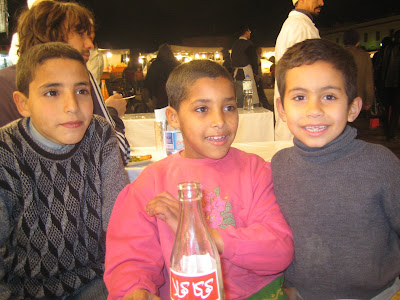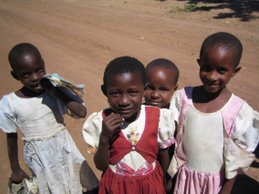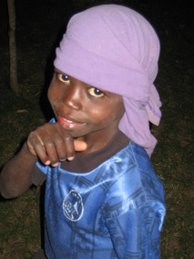Kibuye and Kiziba camp
I didn't realise the buses ran so infrequently to Kibuye (every two hours) and only just caught the last one on Saturday arriving after dark. Kibuye is quite small and there were no taxis about, only moto-taxis, and as I was travelling with my suitcase the only possibility of getting to the guesthouse was on foot. After a few minutes walking I was joined by a young man who offered to carry my suitcase for me. Being somewhat paranoid I turned him down but he kept walking with me asking some questions in English and French, both of us struggling to communicate. When I arrived at the guesthouse about half an hour later he said au revoir and turned around and walked back up the hill we'd just come down. I realised too late he'd been walking with me just to make sure I'd gotten there safely.
In the morning I was so glad to have a full day to rest before going to the camp. The views of Lake Kivu were beautiful and I spent several hours walking around the village exploring. Eventually I found a small beach used by the residents to bathe and fish from and spread out my towel to sunbathe. Every few minutes different groups of children would come and talk to me or passersby stopped to stare.
On Monday I met up with some of the NGO staff and set off for Kiziba refugee camp. It was then that I realised Kibuye is small: when I was introduced to a couple of the workers they told me they'd seen me sunbathing the day before! The camp is about half an hour from Kibuye down a road which at times is incredibly bumpy and you can easily invision slipping over the edge in a downpour. It was without a doubt the worst road I've seen in Rwanda, the workers laughed when I said that and told me it used to be much worse.
The stories I heard in Kiziba were similar to those I'd heard in Gihembe: the refugees didn't have enough firewood, food or sheeting and other materials to build houses. They often had to sell the few things they were given so they could provide more nutricious food, clothes and other things for their families. Kiziba also has a severe land shortage and is housing the seventeen and a half thousand refugees that live there on less than half the amount of land they should have for that number. In addition to overcrowding, it means that latrine and shower facilities are stretched thin and there was a real concern of a cholera outbreak in the camp should it be brought in from outside (there are reports of cholera at the moment in nearby Gisenyi so this is a very real threat).
While I was at Kiziba, I met the handicapped women's association (above) who, with the help of a microcredit programme in the camp, make lovely colourful bags and sell them. Since they began they've expanded from just a couple of members to training more than twenty who are now able to supplement their provisions with income from the association. It takes two women a whole week to create the bags which they sell for 6000 Rwandan Francs (about US$12).
This morning I ate breakfast and said goodbye to Kibuye while enjoying views of Lake Kivu and the Congo in the distance.





.jpg)
























